Continental Hotel, Cairo, Egypt
February 5, 1920
Dear Frances—
My last letter to you was written from Luxor at the Metropolitan Museum House where we had a very profitable and enjoyable visit. Not the least of the pleasures was the arrival of a lot of delayed mail especially your welcome letters of December 25, 26 (No. 7) and January 1 (which I take to be No. 8, but I have mislaid the envelope). There is no gap between December 26 and New Year’s Day, for you refer to your last letter in the New Year’s Day letter; January 2 (No. 9) and January 4 (No. 10). You would not find it is easy to imagine with what attention, and with what unpleasant fullness in my throat, I read your full account of the first Christmas we have ever spent apart in twenty-five years. I will not attempt to acknowledge these letters and take up all the references to which I would love to reply. I can only refer to a few things, as our days are now very short in Egypt and I am pressed indeed. I am so glad you are using the car and getting some benefit out of it during the cold weather.
I must not forget to mention that the suspenders have arrived, the Eversharp, the kuffia, which brought back many an old memory, and the copies of Kadesh. Luckenbill has now handed me also the compasses with which I am very much pleased. It was indeed thoughtful of you to send them and the kuffia also. The compasses, by the way, would have been a legitimate expense for expedition equipment, but as a present from you I want to keep them such. Perhaps one of them might be charged to my accounts and used by Luckenbilll; what do you think?
Of course I was much interested in your experience with T. George Allen. I have great confidence in his character, though he has faults of disposition, and it is to be hoped that these will wear off somewhat. I am sorry you have been troubled with it all. You will remember what a creditable showing he made when his wife was making him and everybody else uncomfortable, especially his old parents, the evening we were there. His conscientiousness, is I think a great asset too; but he must learn to get on with those with whom he has to work.
You evidently had a fine time at your New Year’s dinner with the President and the Ryersons. I am very glad you did it. How different from the days of twenty-five years ago when we were beginning under the old administration! I am about to write the President recounting what I have done, and enumerating additional purchases which we have opportunity of getting, if further funds are made available.
I am glad you had a concert in Mrs. Ryerson’s box, and I hope you will go to the theater again as often as there is anything that is really good. Poor old Buckley! It is really pathetic that he leads such a lonely life; but I fear you will not be able to do much for him!
And now a little about our doings before I turn in! At the Luxor hotel I made the acquaintance of some very interesting and attractive people. I noticed in the dining room at a neighboring table good old Sir Valentine Chiral, who is sending home a series of able letters on the situation in Egypt, now appearing in the Times. I stepped over to speak to him as I went out and he introduced me to Mrs. Spender, a very fine woman, the wife of Alfred Spender, editor of the Westminster Gazette. She is an interesting example of a serious minded woman aiding her husband and deeply interested in his work. Spender is a member of the Government Commission sent out from England by the present cabinet to investigate the Egyptian situation and propose a workable system of government. The commission is headed by Lord Milner. The next day Sir Valentine brought in some newly arrived friends, Mr. John Collier, R. A., the well-known painter, and Mrs. Collier who is a daughter of Huxley; also Miss Huxley, a granddaughter of the famous scientist. They were all charming people, and Mrs. Collier I found to be a worthy daughter of her great father, full of humor as he was, and rarely intelligent and discerning. While I was at the Metropolitan House Sir Valentine brought them over and I took them through some of the Theban tombs, — a trip to which I also invited Davies. Afterwards we had tea at the house, and much pleasant discourse.
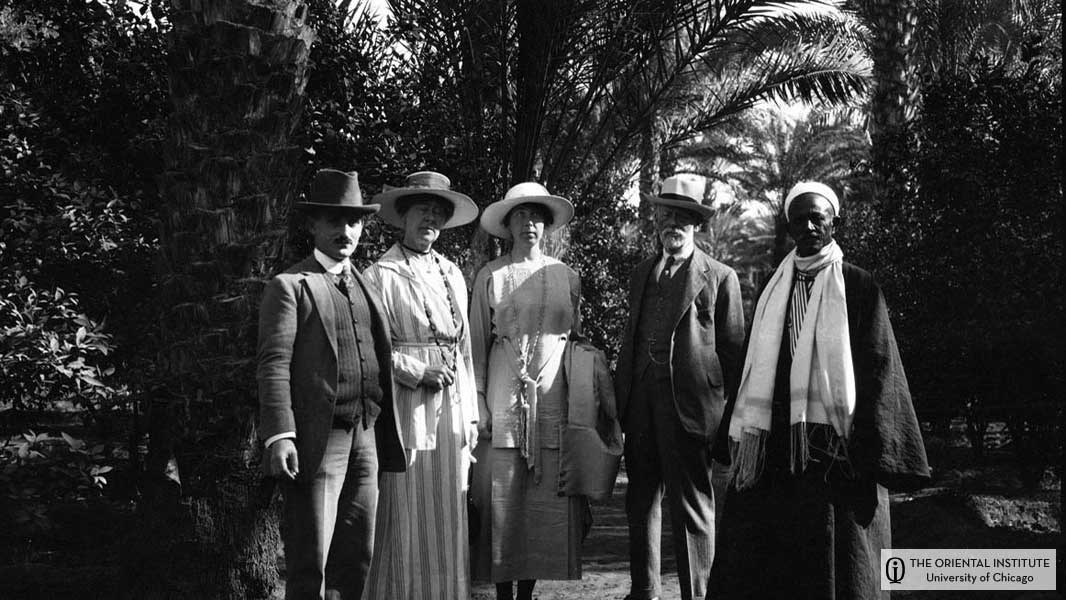 Breasted and party visiting antiquities dealer Yussuf Hasan in Luxor. Far right, the antiquities dealer Yussuf Hasan. The others, left to right, are Ludlow Bull, Mrs. J. collier, and Miss Huxley. Breasted took the photo. January 1920 (N. 3163, P. 6722)
Breasted and party visiting antiquities dealer Yussuf Hasan in Luxor. Far right, the antiquities dealer Yussuf Hasan. The others, left to right, are Ludlow Bull, Mrs. J. collier, and Miss Huxley. Breasted took the photo. January 1920 (N. 3163, P. 6722)
I should not fail to tell you that Davies has been completely transformed by his marriage. He is a different man. He is also a very lucky one — perhaps luckier than he deserved, for he has married a noticeably pretty, sensible, sunny and industrious wife, to whom he is completely devoted, and it was pleasant to see. You notice that I put “pretty” first, as I did when I married myself!
When Bull and I returned to the east side and entered the dining room of the hotel for dinner, Sir Valentine and the Colliers made the waiter shift our plates to their table, and we lunched and dined with them for the remainder of our stay. Mrs. Spender was also there and she had interesting tales to tell of the native discontent at Assuan [Aswan]. England is in for long-continued troubles and anxieties in this country, which she cannot possibly cast adrift. The Commission has had the old Semiramis Hotel placed at its disposal and it lives there and holds its meetings and has its offices there. I lunched there yesterday with Mr. Spender and Sir Rennell Rodd, both members of the Commission and had a very interesting time. I am going to lunch with them again tomorrow. It is a curious sensation to be consulted by British dignitaries of this sort on conditions in Egypt and the Near East, when I have never been so honored by the statesmen who control the policy of our own country in these ancient lands. I shall be in close touch with the Commission from now on, but unfortunately I have no time to give to the matter, though the importance of giving time to it can hardly be overestimated.
Night before last I dined with Lord and Lady Carnarvon and their daughter Lady Evelyn Herbert (who have just arrived and are at this hotel), to meet Major-General Sir John Maxwell, who is also a member of the Commission. We had a long talk lasting till nearly midnight, on the unsolvable problem of the future of Egypt and the remedy for the present troubles. I wish there were time to write you all about it, but I cannot find time even to make any notes of the facts in the case, and my memory is no longer to be trusted in such matters, I am sorry to say.
You will be interested to know that while at Luxor I had a letter from Mrs. Warren announcing her arrival in Cairo and asking many questions of course. I did not reply until my arrival here, and meantime I had devised a plan for disposing of her without unkindness, but nevertheless I believe effectually. I determined to put her in the hands of the Countess, who as you remember lives at this hotel. The first time I entered the dining room I sauntered over to the Countess’s table and told her my wife had written me about the widow of a deceased colleague, an authoress etc., etc., etc., and would the Countess kindly look after her a bit and introduce her to people! The Countess seems to have swallowed my bait fairly well, for she was immensely flattered. I enclose you some of her recent letters, especially one to Lansing asking him to tea tomorrow. Meantime I had written a little note to Maude R. Warren, asking her to come to the hotel tomorrow at five and I would take her up to the Countess’s rooms for tea, answer her questions as best I could, and that thereafter the Countess would take her under her wing.
Meantime I was in the Museum on business when Firth greeted me with great amusement, and told me a story which I hope will be a source of amusement to my better half as it finally was to me, rather than of anger as it was when I first heard it. Firth said: “There was a lady in here yesterday and she approached me with an apology for asking a question. She very much desired my opinion as the possibility of her being able to go with Professor Breasted to Mesopotamia! What did I think of it? I told her she was asking a question which nobody else but Professor Breasted could answer”. Thereupon, observing my wrath, Firth most irrelevantly and inappropriately burst into mirth. My first reply to Firth was to the effect that my wife had written me about this lady. And then I told him who she was. Firth’s tale explained a call which Bull had received from Maude the day before; for she asked Firth the name of some member of my party whom she could consult; “for”, said Firth, “she seemed deathly afraid of going to you about it”. Bull came to me at once to tell me she had called on him, and I, not yet having heard Firth’s tale, said to him at once, “She wants to go with us”. “Well,” said Bull, “I haven’t told you, remember, for she made me promise I wouldn’t”. There, my dear, you have the beginning and also the end, for Bull turned her down flat he told me, and she will get nothing out of me but the courtesy due a colleague’s widow. Wouldn’t I create a nice sensation among the young officers and diplomats at the Residency, by asking them to let me take a lady along! I have told the whole story to the Metropolitan Museum group, who are here and sit at our table, and also to Luckenbill. Besides being a wise precaution, this seemed also appropriate because Maude wants to see their excavations and asked me in her Luxor letter to intercede for her in that quarter. I will let you know what the Countess says to her!
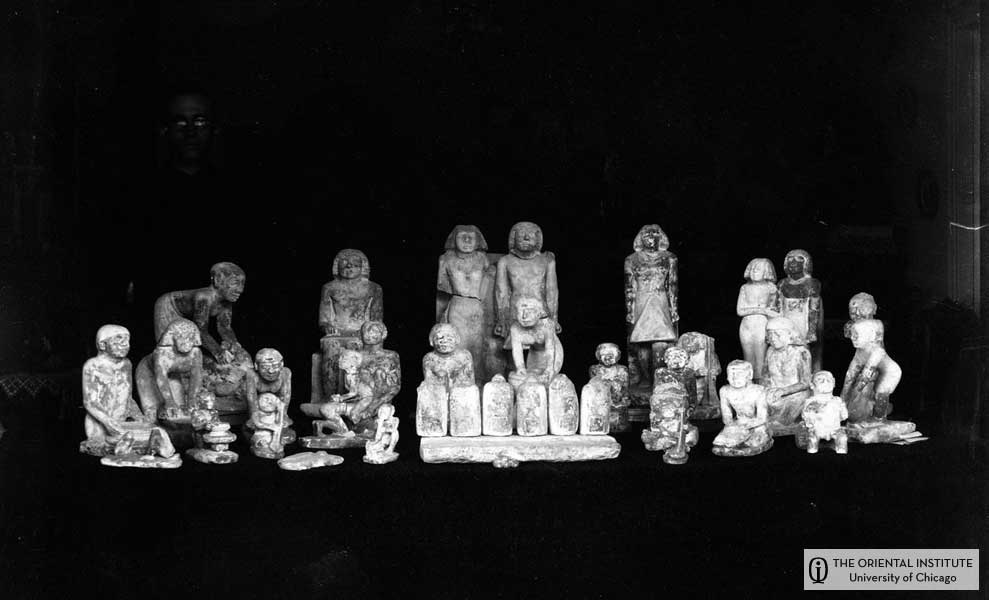 Cairo: View of the group of serving statues at the home of Nicholas Tano. Edgerton’s face is just visible in the background. February 5, 1920. (N. 4087, P. 7775)
Cairo: View of the group of serving statues at the home of Nicholas Tano. Edgerton’s face is just visible in the background. February 5, 1920. (N. 4087, P. 7775)
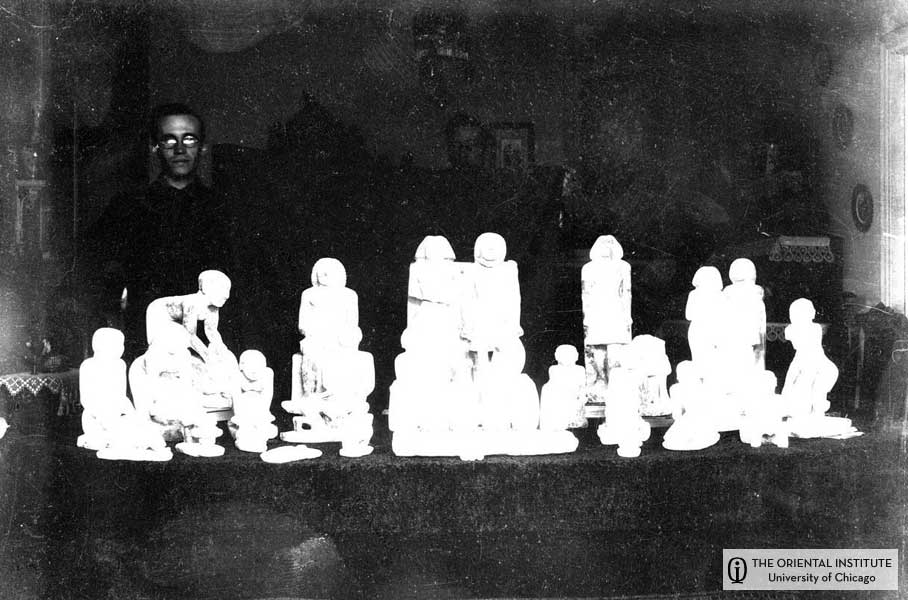 Cairo: View of the group of serving statues at the home of Nicholas Tano. Edgerton and unknown man are just visible in the background. February 5, 1920. (N. 4087, P. 7775)
Cairo: View of the group of serving statues at the home of Nicholas Tano. Edgerton and unknown man are just visible in the background. February 5, 1920. (N. 4087, P. 7775)
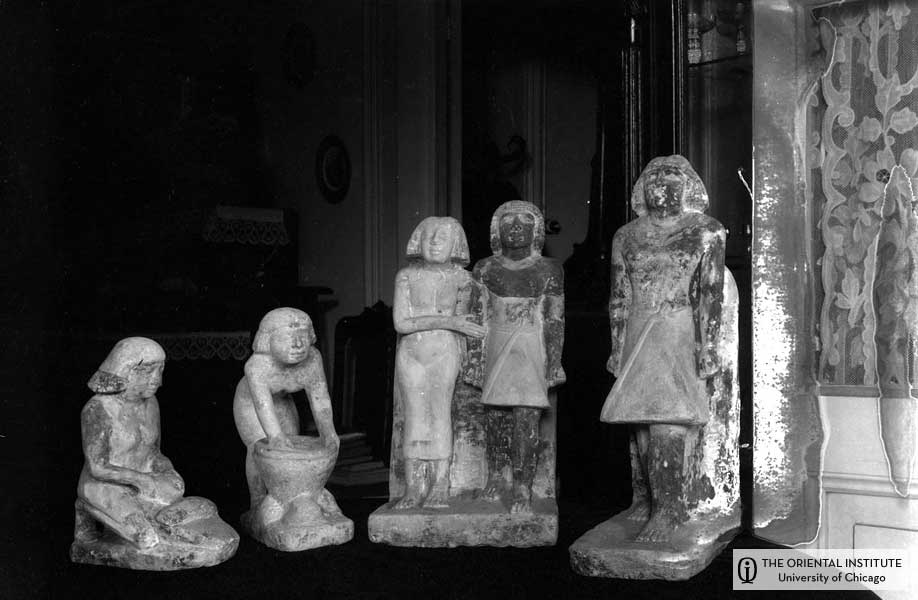 Cairo: Four statuettes from the tomb of Nanupkau purchased by Breasted from Nicholas Tano: deceased and wife, daughter, and servant maids. February 5, 1920. (N. 4090, P. 7778)
Cairo: Four statuettes from the tomb of Nanupkau purchased by Breasted from Nicholas Tano: deceased and wife, daughter, and servant maids. February 5, 1920. (N. 4090, P. 7778)
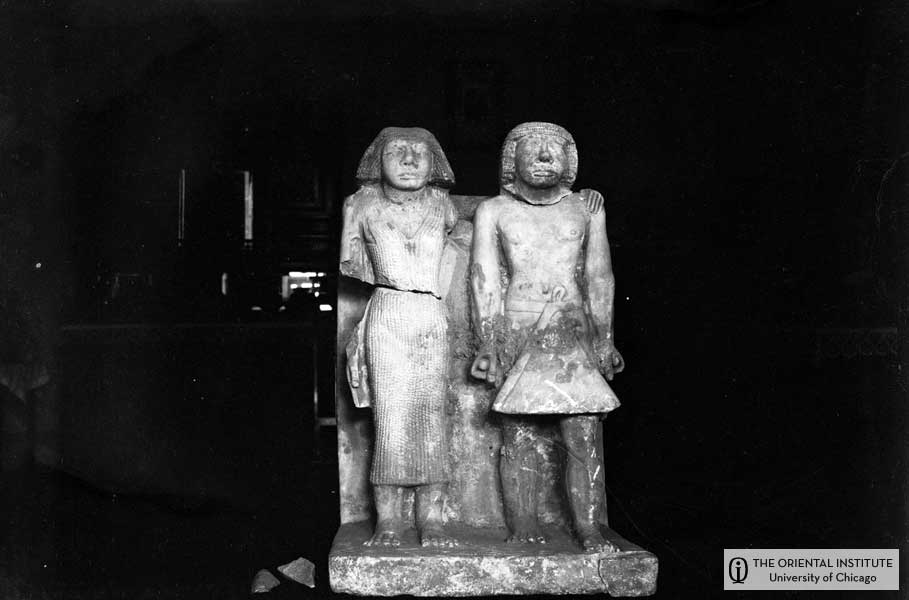 Statuette of limestone of Nanupkau and wife from tomb equipment (on display at the Oriental Institute Museum, in the “Pioneers to the Past: American Archaeologists in the Middle East 1919-1920). February 5, 1920. (N. 4092, P. 7780)
Statuette of limestone of Nanupkau and wife from tomb equipment (on display at the Oriental Institute Museum, in the “Pioneers to the Past: American Archaeologists in the Middle East 1919-1920). February 5, 1920. (N. 4092, P. 7780)
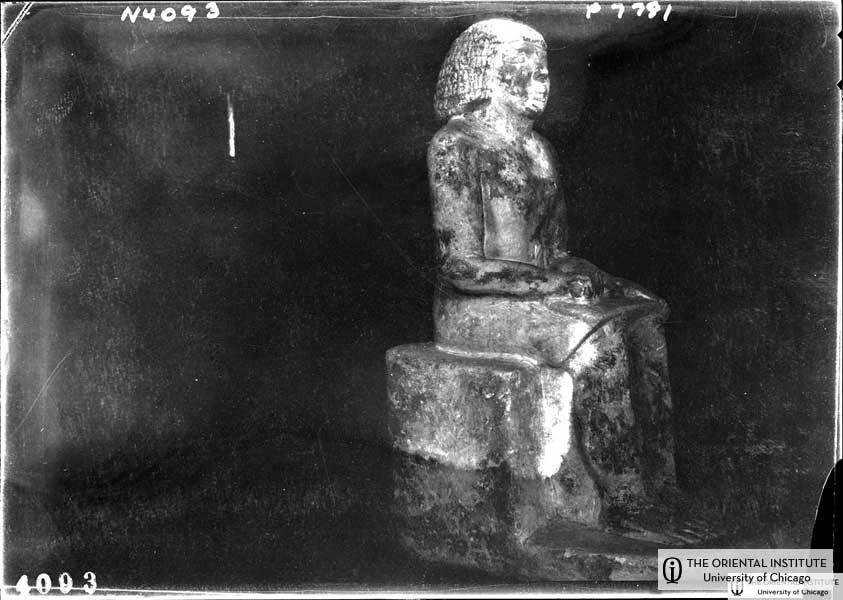 Seated limestone statuette of Nanupkau. February 5, 1920. (N. 4093, P. 7781)
Seated limestone statuette of Nanupkau. February 5, 1920. (N. 4093, P. 7781)
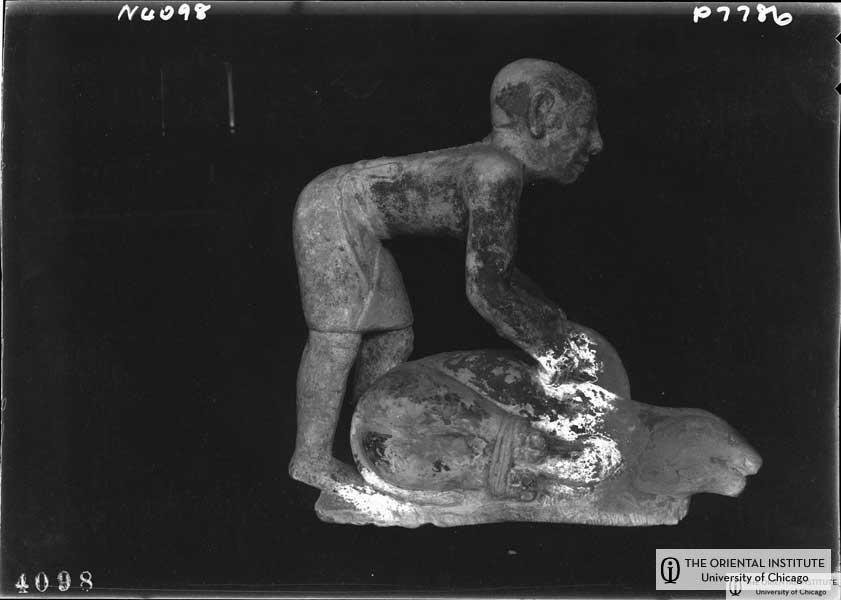 Limestone statue of a man cutting up an ox, part of the tomb equipment of Nanupkau (on display at the Oriental Institute Museum, in the “Pioneers to the Past: American Archaeologists in the Middle East 1919-1920). February 5, 1920. (N. 4098, P. 7786)
Limestone statue of a man cutting up an ox, part of the tomb equipment of Nanupkau (on display at the Oriental Institute Museum, in the “Pioneers to the Past: American Archaeologists in the Middle East 1919-1920). February 5, 1920. (N. 4098, P. 7786)
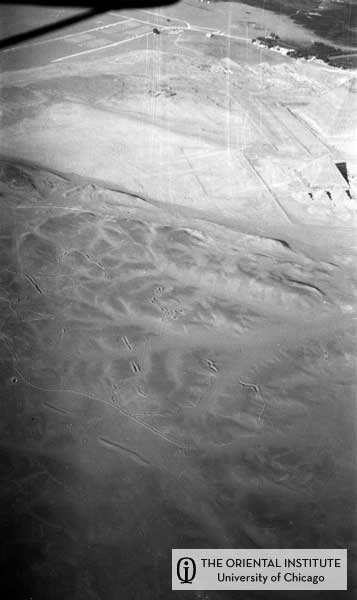 Giza: Airplane view looking northeast over desert to pyramids of Menkure and Khafre; Mena House hotel in background. Note trenches in foreground. February 5, 1920. (N. 4193, P. 7798)
Giza: Airplane view looking northeast over desert to pyramids of Menkure and Khafre; Mena House hotel in background. Note trenches in foreground. February 5, 1920. (N. 4193, P. 7798)
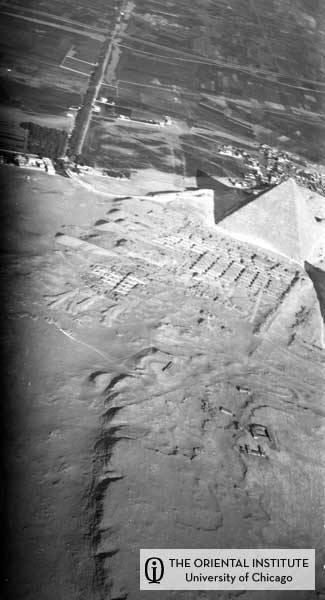 Giza: Airplane view looking southeast over great pyramid, mastabas, and Mena house hotel, along the road to Cairo. February 5, 1920. (N. 4194, P. 7799)
Giza: Airplane view looking southeast over great pyramid, mastabas, and Mena house hotel, along the road to Cairo. February 5, 1920. (N. 4194, P. 7799)
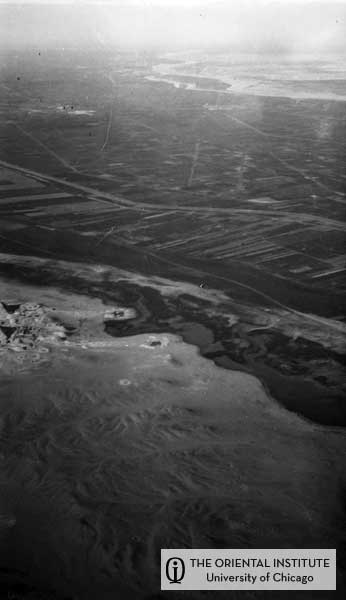 Abusir: Air view looking northeast across mortuary and valley temples of Ny-user-Ra and Sahu-Ra to alluvium. (N. 4190, P. 7796)
Abusir: Air view looking northeast across mortuary and valley temples of Ny-user-Ra and Sahu-Ra to alluvium. (N. 4190, P. 7796)
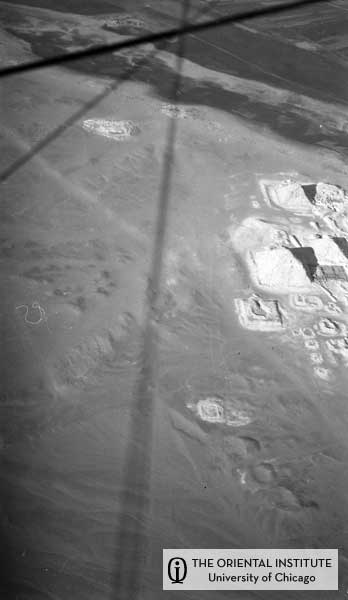 View looking north across pyramids of Nefer-ir-ka-Ra, Ny-user-Ra, and Sahu-Ra to alluvium. (N. 4191, P. 7797)
View looking north across pyramids of Nefer-ir-ka-Ra, Ny-user-Ra, and Sahu-Ra to alluvium. (N. 4191, P. 7797)
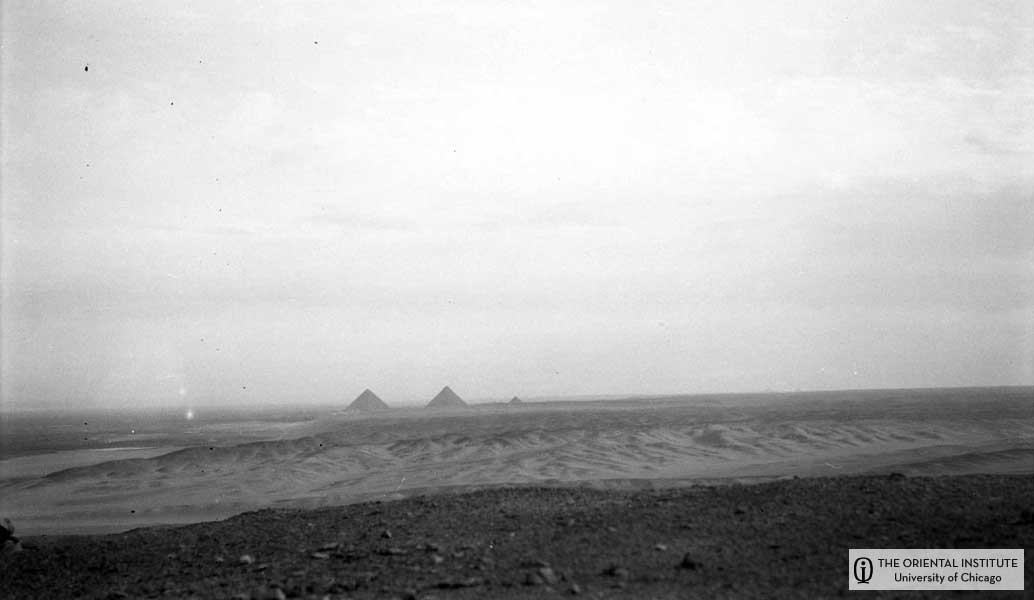 Giza: View looking southeast to pyramids. February 5, 1920. (N. 4199, P. 7801)
Giza: View looking southeast to pyramids. February 5, 1920. (N. 4199, P. 7801)
For the full story of my exciting trip you should come to the special exhibit “Pioneers to the Past: American Archaeologists in the Middle East, 1919-1920,” at the Oriental Institute!
1155 East 58th Street Chicago, IL 60637
Hours:
- Tuesday 10:00 am to 6:00 pm
- Wednesday 10:00 am to 8:30 pm
- Thursday 10:00 am to 6:00 pm
- Friday 10:00 am to 6:00 pm
- Saturday 10:00 am to 6:00 pm
- Sunday noon to 6:00 pm
- Closed Mondays
http://oi.uchicago.edu/museum/special/pioneer/
And visit my facebook at: http://oi.uchicago.edu/museum/special/pioneer/